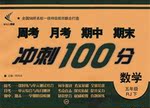题目内容
----Dad, the bread is not enough. I am still hungry. I have something more?
----But there’s nothing in the fridge now.
A. Must B. Need C. Will D. Can
D
【解析】考查情态动词的用法。must意思是“一定,必须”;need意为“需要”;will意思是“将要”;can意思是“可能,可以”。根据句子“I am still hungry. 我仍旧很俄。”可推断“我可以再吃点东西吗”,故选D。

 新非凡教辅冲刺100分系列答案
新非凡教辅冲刺100分系列答案
I used to live in Kobe in Japan. On my way home on the bus every evening I used to look for an old man who often played his saxophone (萨克斯管) near the river. I couldn’t hear his music because the windows were closed on the bus but I imagined it to be loud and clear. I wanted to be like that man.
One night I went to Himeji, a city not far from Kobe. As I walked with my family along the river I saw a statue. It was a young man who looked just like me. He was wearing a cap and smiling. Around his neck was a leather strap (皮带) and in his hands was a saxophone. He was lifting the saxophone to his lips and he was just about to play. I stayed there for a long time by the statue dreaming of playing a saxophone on TV.
Two weeks later it was my birthday. Imagine my joy when I opened my present from my parents and found that it was a saxophone! I put it to my lips to play, but it wouldn’t make a sound. Then Dad told me to read the instruction book to find out what to do. After about 15 minutes the saxophone was ready to play. I raised it slowly to my lips as my family watched. But still there was no sound. I blew and blew but I couldn’t get the saxophone to play. I was almost crying when suddenly the saxophone made the most beautiful sound—loud and clear like I imagined the music of the man by the river in Kobe. I blew again, I moved my fingers on the saxophone and I made more sounds. I was happy because I was playing very interesting sounds. But I wasn’t playing music yet.
Then came the lessons. Night after night, week after week my teacher made me practice. Slowly I started to improve and at last there came the magic day when I started to play music. Now I’m in the TV studio with my saxophone strapped to my neck and my cap on my head. I’m always thinking of the man by the river in Kobe and the statue smiling at me in Himeiji. I’m a happy man.
【小题1】On the bus, the writer couldn’t ________.
| A.find an old man with a saxophone | B.see a river |
| C.hear the old man’s music | D.imagine the sound |
| A.having a saxophone |
| B.the old man near the river |
| C.having a cap and a saxophone as the boy |
| D.playing the saxophone on TV |
| A.as soon as he got it |
| B.after he read the instruction |
| C.after he tried many times |
| D.after his father taught him |
| A.The magic day. | B.My birthday present. |
| C.The old man and the statue. | D.My dream of playing saxophone. |
阅读下面短文,根据短文内容用方框内所给词汇或短语的适当形式填空,使短文语义完整。(温馨提示:一定要注意词语的形式变化!)
|
One put up so also way from can be wall |
One day, when Bill was 1. home from school, he heard a noise coming from the bushes(灌木).He went over to see 2. it was. Behind a bush, he found a black dog. Bill went back home as soon as he 3. with the dog and showed her to his parents. Bill's dad found that the dog had a broken leg, 4. they brought the dog to a doctor for animals by car. On the 5. Bill's parents decided that Bill could keep the dog if they couldn't find the owner.
When they arrived,the doctor checked the dog. He told Bill that she 6. going to have babies! The next day, Bill 7. signs(牌子)like “FOUND DOG BLACK” around his neighborhood. He 8. wrote his family's phone number on the signs.
Two days later, Bill got a call 9. the owner of the dog. The owner thanked Bill. When he came to pick up his dog, he said Bill could have 10. of the babies. Bill was very happy! Finally Bill got a baby dog from the owner. He named him Rosco and liked him very much.
 B.
Of C.
To D.
In
B.
Of C.
To D.
In